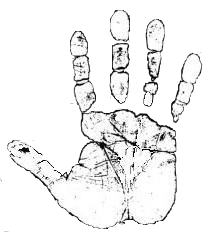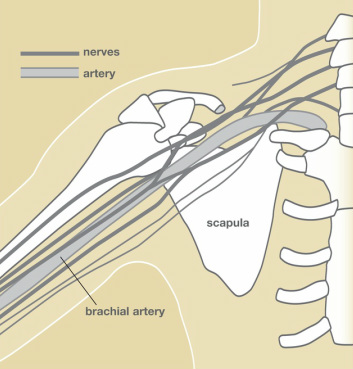MAKE AN APPOINTMENT TODAY!
Brachial Plexus Injury
When nerve fibers are cut, the end of the fiber farthest from the brain dies, while the insulation stays healthy. The end that is closest to the brain does not die, and after some time may begin to heal. If the insulation was not cut, new fibers may grow down the empty cover of the tissue until reaching a muscle or sensory receptor. Some brachial plexus injuries are minor and will completely recover in several weeks. Other injuries are severe enough that some permanent disability involving the arm can be expected. Treatment of Brachial Plexus InjuriesBrachial plexus injurycan recover with time and therapy. The time for recovery can be weeks or months. When an injury is unlikely to improve, several surgical techniques can be used to improve the recovery. To help decide which brachial plexus injury is likely to recover, your physician will rely upon multiple examinations of the arm and hand to check the strength of muscles and sensation. Additional testing, such as an MRI scan, or CT scan/myelography, may be used to visually evaluate the brachial plexus injury. A Nerve Conduction Study/Electromyogram (NCS/EMG), a test that measures the electrical activity transmitted by nerves and muscles, may also be performed. In some cases, repair of the nerves or transfer of undamaged nerves from other areas of the body can be performed. In other cases, transfer of functioning muscles (tendon transfer) to take over areas of lost function can be performed.
Brachial Plexus RecoveryThe patient must do several things to keep up muscle activity and prevent the joints from getting stiff. Your doctor may recommend therapy to keep joints flexible. If the joints become stiff, they will not work even after muscles begin to work again. When a sensory nerve has been injured, the patient must be extra careful not to burn or cut fingers since there is no feeling in the affected area. After the nerve has recovered, the brain gets lazy and a procedure called sensory re-education may be needed to improve feeling in the hand or finger. Your doctor will recommend the appropriate therapy based on the nature of your injury.
Factors that may affect results after brachial plexus injury include age and the type, severity, and location of the injury. Though brachial plexus injury may result in lasting problems for the patient, care by a physician and proper therapy can maximize function. Reproduced with permission from the American Society for Surgery of the Hand www.handcare.org
|
Ask Dr. Izadi
Wide Awake Hand Surgery Most hand and wrist conditions including fractures can be treated under local anesthesia.
Learn More
Second Opinion Your peace of mind is invaluable and getting a second opinion is easy.
Learn More
Where Does It Hurt? Not sure what your symptoms mean? This interactive tool may help you.
Learn More

Dr. Izadi in the News Blog |
Disclaimer and Privacy
IZADIHAND.COM © 2011-2022 Kayvon David Izadi MD - All Rights Reserved
Webmaster
IZADIHAND.COM © 2011-2022 Kayvon David Izadi MD - All Rights Reserved
Webmaster


